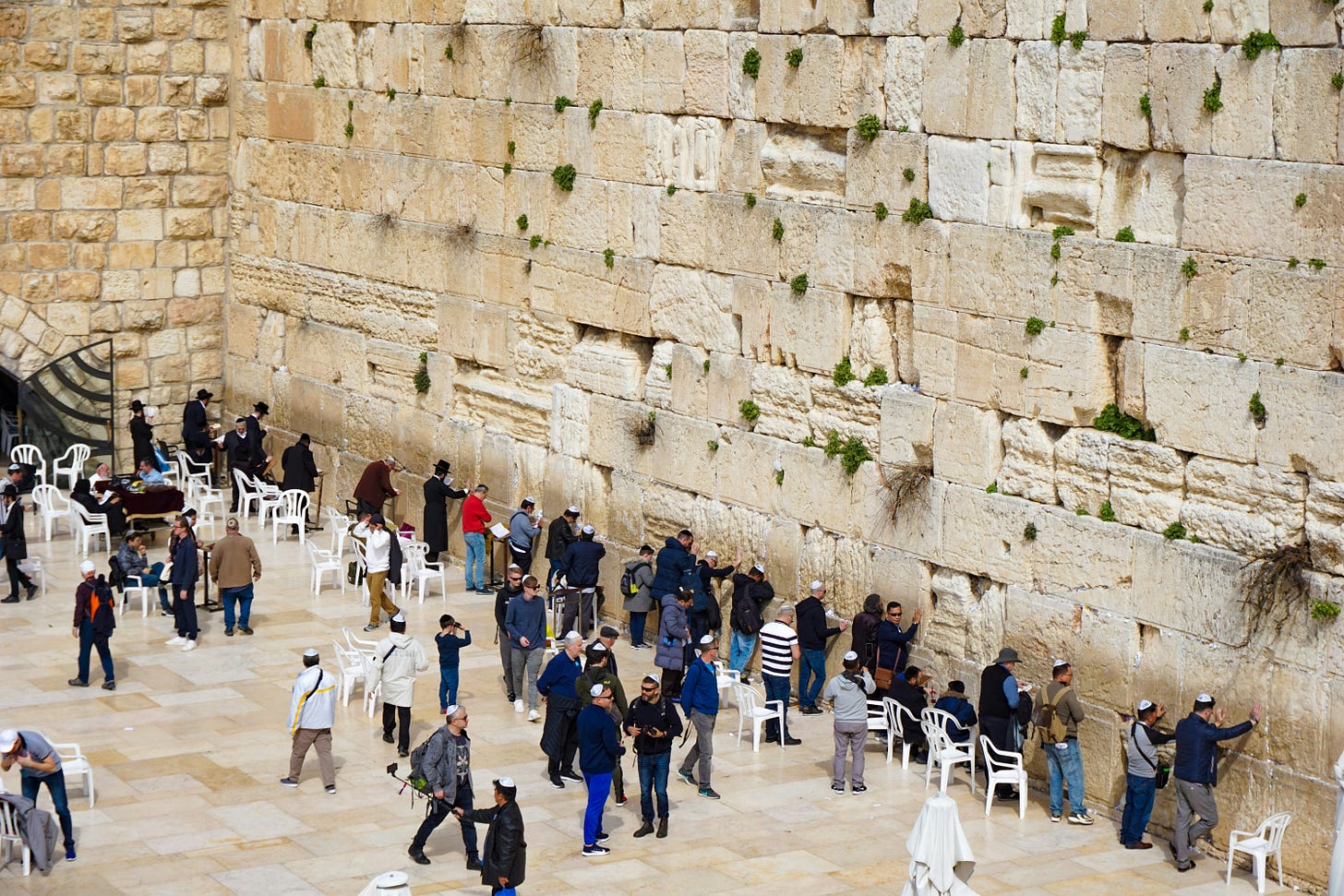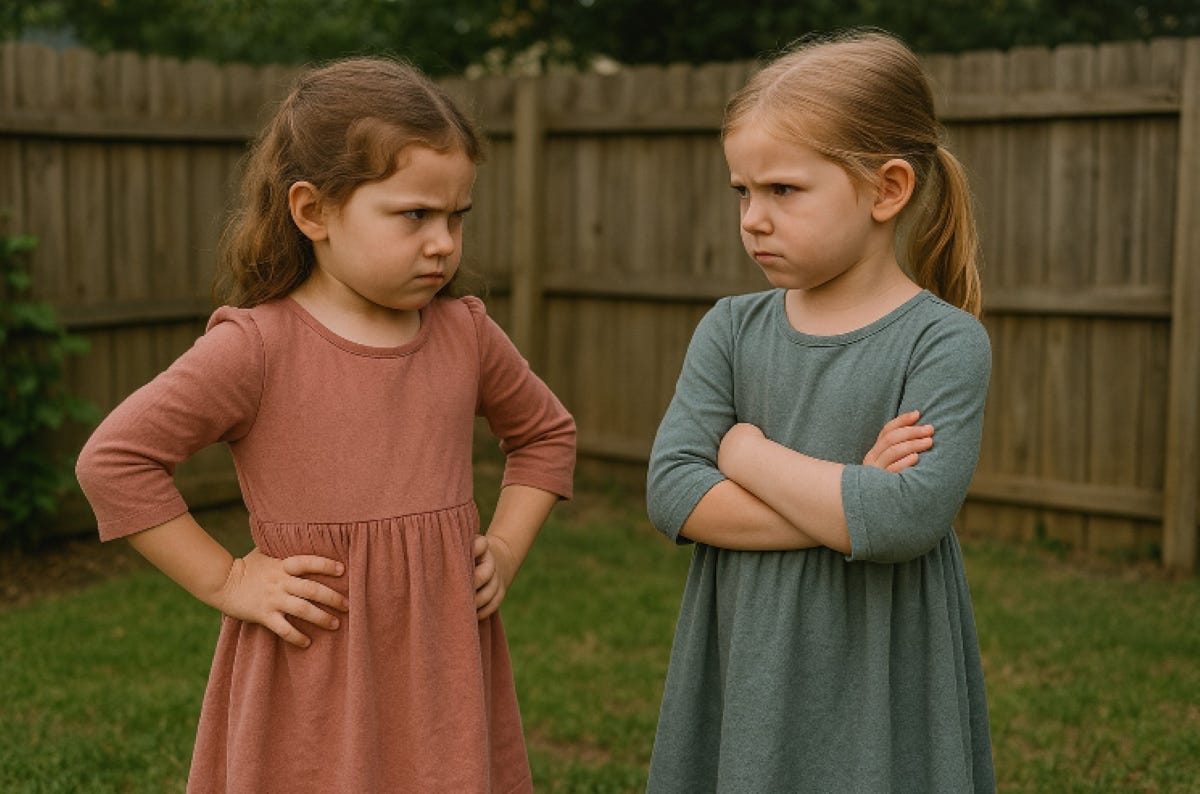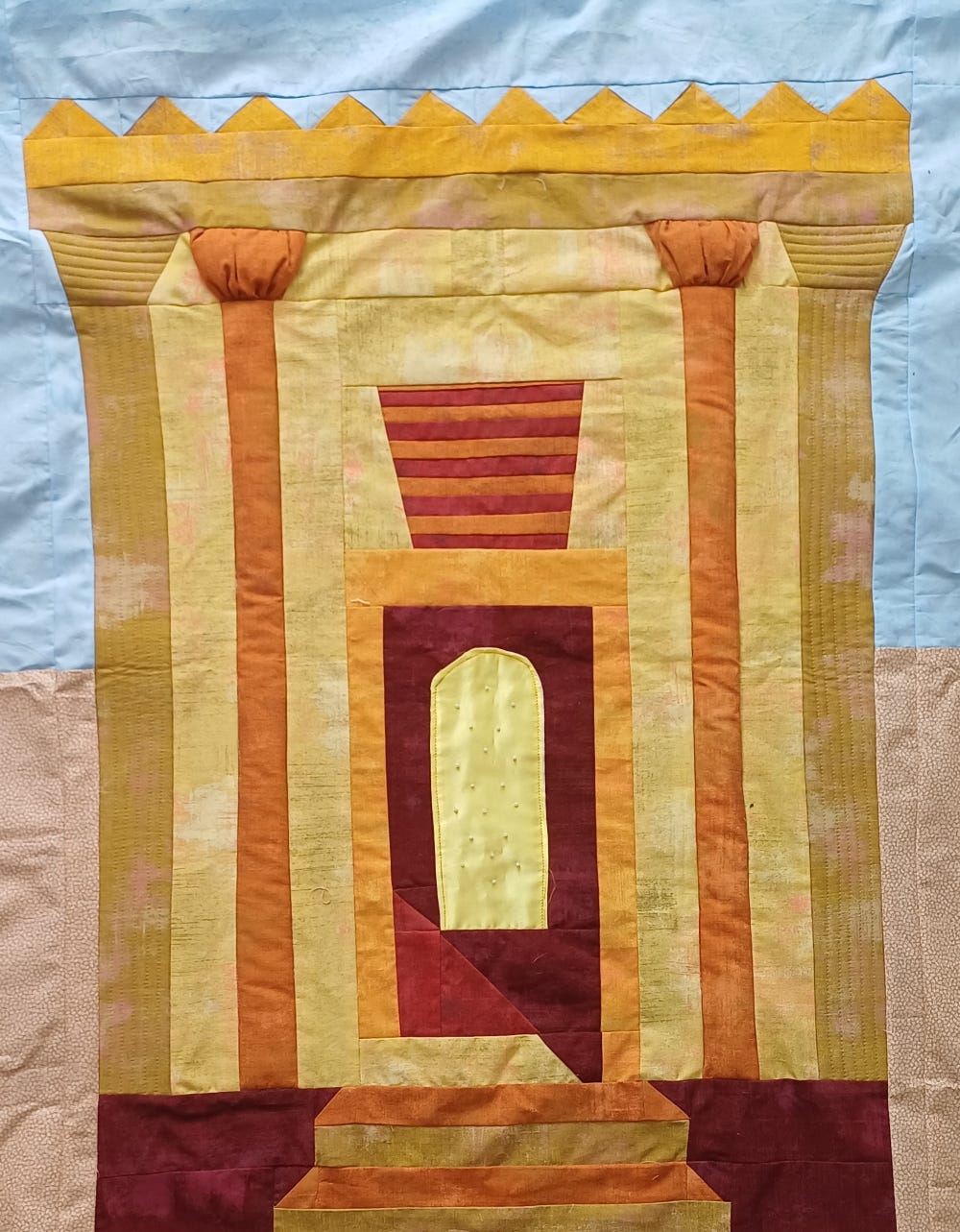Don't Say Poopy Head!
A story for children 4-7 about Tisha B'Av, using bad names, and senseless hatred
"Poopy head! Poopy head!" Hands on her hips, Sharona stood on the grass yelling at her friend. "Poopy head!"
Mom put down the pot she was washing and went to the back door. "Sharona, get in here right now. Alana, time for you to go home. I'll tell your mother you're coming," said Mom as she picked up her phone.
Dragging her feet, Sharona went inside.
"You cannot call anyone poopy head," said Mom. "It's not a nice name."
"But Alana didn't play nice." Sharona stamped her foot.
"We do not have to like everyone. We can get angry at them. But we cannot call them names." Mom took Sharona's hand and went into the living room. "Let me tell you a story." She sat down and pulled Sharona onto the sofa next to her.
"A story about you?" asked Sharona hopefully.
"No, a story that happened a long, long time ago." Mom turned and pointed at a wall quilt hanging above Dad’s chair. "What's that building?" she asked.
"That's the Temple in Jerusalem," said Sharona.
"Right," said Mom. "And what's that photograph next to it?"
Sharona bounced up and down. "That's the picture Daddy took when we were walking to that wall in Israel," she said.

"Right," said Mom. "What’s that wall, do you remember?"
Sharona bit her lip, thinking hard. "I don't remember," she said slowly. "But it’s important."
Mom nodded slowly. "It's all that's left of the Temple in Jerusalem."
"All that's left is one wall?" Sharona opened her eyes wide. "What about that beautiful building? Isn't it there?"
“My wall quilt is what many people think the building looked like," said Mom. "That wall and some pillars are what is left. The rest was destroyed long, long ago."
"Why?" asked Sharona.
"Because people said bad things about each other," said Mom. "That's the story I am going to tell you."
A long, long time ago there were two men whose names were almost the same. One was Kamtza, one was Bar Kamtza. Kamtza and his friends were not friendly with Bar Kamtza. They didn't have a good reason, they just didn't like him. One day, one of Kamtza's friends was having a party. He invited all his friends. But his servant made a mistake. He invited Bar Kamtza instead of Kamtza.i
Bar Kamtza came to the party. Maybe he thought that the friend was sorry that they had been enemies. We don't know. But he came to the party.
When he came, the man having the party got mad. He told Bar Kamtza to leave. Bar Kamtza said, "I'm here now, please let me stay." He begged and begged, but the man having the party said no.
Everyone at the party heard the argument. No one said, "Come on, Joe, let Bar Kamtza stay!" Not even the important rabbis, leaders of the city.
Bar Kamtza's feelings were hurt. He was embarrassed in front of the most important people! So he went to the government--the Romans--and lied to them. They got mad at the Jews and destroyed the Temple. Thousands of Jews were killed and most of the other Jews of Jerusalem were made slaves and taken to Rome. Jerusalem was destroyed." Mom was silent.
Sharona bit her lip.
"Why was Jerusalem destroyed?" asked Mom.ii
"Because that man lied?" asked Sharona.
"Well, yes," said Mom. "But that wasn't the first reason."
"Because that man didn't just go home?"
"Before that."
Sharona thought hard.
"Because that man went to the party?"
"Even before that."
Sharona scratched a mosquito bite on her leg and thought some more. She thought about playing with Alana and calling her names.
In a very little voice she asked, "Because the men called each other bad names?"
"Excellent!" exclaimed Mom. "We don't have to be friends with everyone, but we need to treat everyone with respect. We don't have to be friends. We can get angry at people. But we should never call them bad names and we should never be mean to them. Even bad people like robbers who need to go to jail. They need to be punished, but the punishment is enough. We don't have to be extra mean to them.
"Even good people make mistakes. I do, Dad does. We can tell people, 'I don't like what you did.' But Hillel said we shouldn't do things or say things to people that we don't want them to do to us."iii
"So the party man should have invited that man?" asked Sharona.
"No, he didn't have to invite him. But when that man came, the party man should not have embarrassed him. He should have invited him in and treated him okay. Bar Kamtza made an honest mistake. He was invited by mistake, but he did not know that.
"And when the party man started to get mad, some of the other people should have said, 'Hey, Joe, cool down, let him stay!'"
Sharona drew fingernail circles around her bug bite. "And then Bar Kam... then he wouldn't have lied and the Temple would still be there?"
Mom nodded.
They were quiet a long time.
"Can I go next door and tell Alana I'm sorry I called her a bad name?" Sharona whispered her question.
"Good idea! Let's take a plate of cookies," said Mom. "Sometimes a little gift makes it easier to say 'I'm sorry.'"
For Parents, Teachers, and Others
Tisha B'Av, the ninth day of the month of Av, the date that the Temple in Jerusalem was destroyed twice, has been a day that our enemies have used to torment us throughout the generations.iv Seven major incidents affecting the Jewish People occurred on this day. The first was the Biblical incident of the spies that Moses sent out to report back on the land. They gave a bad report that showed little or no faith in the God that had just opened the Red Sea to let the Jews cross. The most recent was the beginning of World War I, which unleashed unprecedented destruction on Europe culminating in the Holocaust, when one-third of all Jews in the world were killed.
Three weeks before Tisha B'Av, the 17th of the month of Tammuz, was the day that the Romans breached the walls of Jerusalem in the year 70. This marked the beginning of the destruction of the Second Temple, which fell on the 9th of Av. Five calamities befell the Jewish people on this day as well.v
The 17th of Tammuz is a partial fast: from shortly before sun-up until shortly after dark, observant Jews neither eat nor drink. Special prayers are said. Observant Jews observe some of the practices of mourning the death of a loved one.
From the first of the month of Av, additional mourning practices are followed. The 9th of Av itself is a full fast. That is, from before sundown on the 8th of Av until shortly after sundown on the 9th of Av, no food or drink passes the lips of most observant Jews. (Jewish days are counted from nightfall until nightfall rather than midnight to midnight as westerners do today.)
Many people make a special effort to avoid speaking badly of others during this period because causeless hatred began the spiral of events culminating in the destruction of the Second Temple.
Relevant Stories and Articles
Last year I published several articles about Tisha B'Av and its role in Judaism as well as two stories for older children.
Why Remember the Past? is about Judaism's emphasis on remembering our history. For adults.
Baseless Hatred: What It Is, How It Hurts discusses several causes of hatred and the Jewish response to each. For adults.
The Catholic Jew, based on a family story that I heard when I worked in a Jewish nursing home, deals with baseless hatred and how it can sometimes come back to bite the hater. For teens.
Jerusalem Tunnel is reprinted from Ghosts and Golems, Jewish Publication Society, 2001, (c) Hanna Bandes Geshelin. It is a time-travel story set on Tisha B'Av, 70 CE. For kids 9-14.
Notes
i Kamtza and Bar Kamtza: The Story of Tisha B'Av. https://www.chabad.org/library/article_cdo/aid/404863/jewish/Kamtza-and-Bar-Kamtza.htm
ii At this point, the reader can stop reading and ask the listener(s) the questions.
iii Nightengale, T., Whatever is hateful to you, donot do to your fellow man. https://aish.com/judaisms-golden-rule/
iv What Happened on the Ninth of Av, https://www.chabad.org/library/article_cdo/aid/946703/jewish/What-Happened-on-the-Ninth-of-Av.htm
v Simmons, Rabbi S., 17th of Tammuz, https://aish.com/48943446/





Thank you, for this important and gentle reminder.